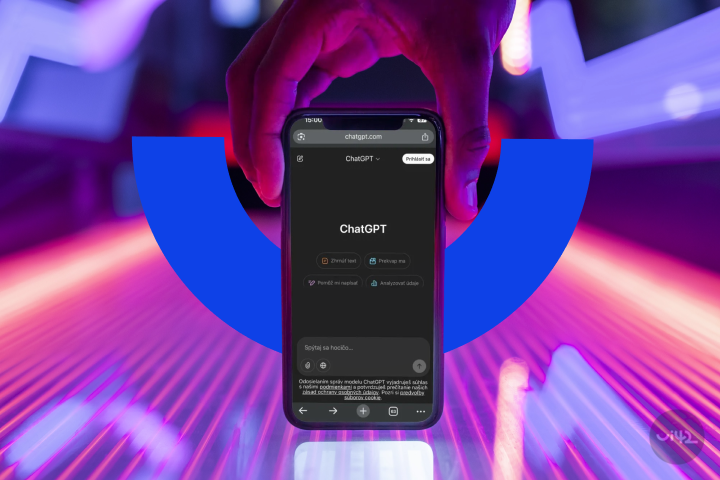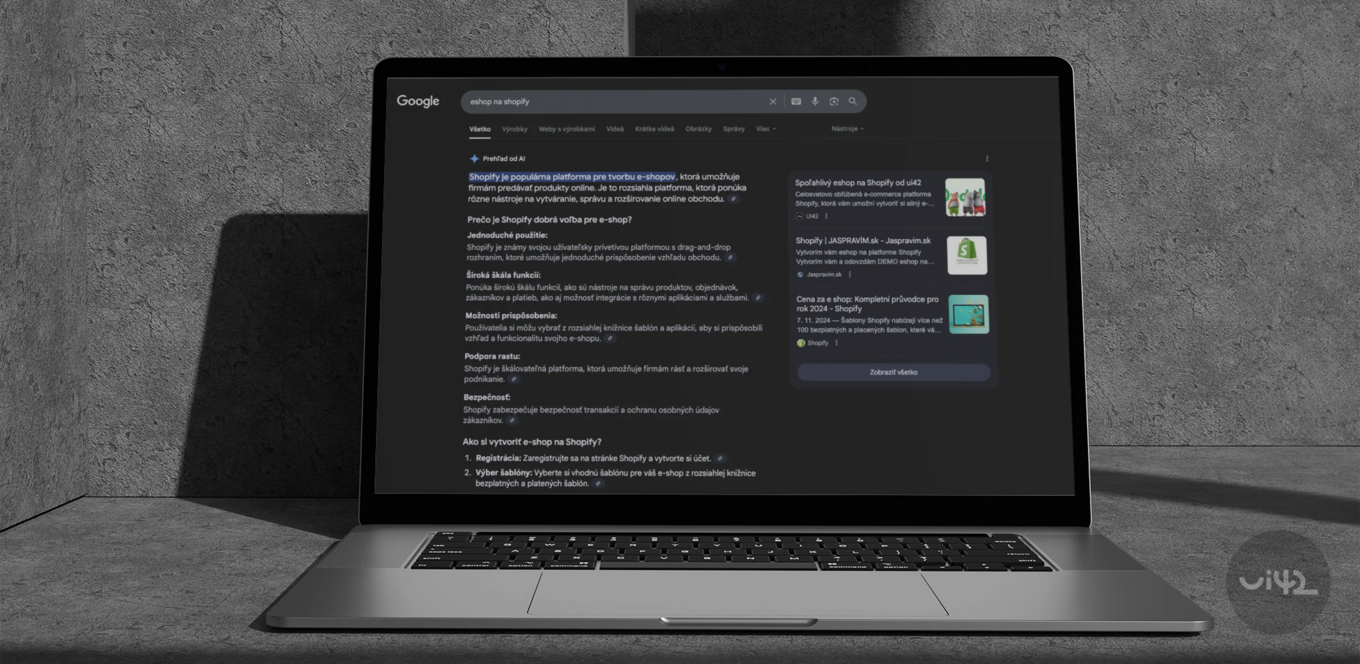SEO is not dead, it is just evolving into GEO today. Browser searching, clicking through dozens of links just to find the right answer will soon be a thing of the past. Tools like Google AI Overviews, ChatGPT, and Gemini are no longer sci-fi – they are here and transforming the way people search for and find information online.

Instead of clicking through links, we now get instant, accurate, and summarized answers directly in the search engine. This means that if the goal of AI is to provide direct and quality answers, your content strategy must focus on one thing: becoming the definitive source of these answers. This requires going deeper into the issue, focusing on the complexity, clarity, directness of your content, and not just on optimization for clicks.
AI Optimization: The New Pillar of Your Online Visibility and Why "Classic" SEO is No Longer Enough
You may have heard terms like AI SEO or Generative Search Optimization (GEO). In reality, it is a strategic process by which you adapt the content and technical background of your website so that it is not only found but also understood and mainly cited by AI tools and large language models (LLM).
GEO goes beyond traditional SEO, which is based on keywords and prioritizes context, quality, and the real intent of the user.5 The main goal is to ensure that your content is not only discovered but also accurately summarized and cited as a trusted source in AI-generated answers. 1
AI optimization is about building thematic authority and semantic understanding. Your content must anticipate the various questions and intentions that users may have. Think of it as "context instead of keywords" – because AI is looking for answers, not just phrases.
Why is AI Tool Citation Key for Your Content?
As AI Overviews appear at the top of search results, they often push organic listings down by more than 140%.2 This means that citation by AI tools is key to maintaining online visibility.
Citation by AI tools means that your brand becomes a trusted source of information directly in the answers that AI generates. The metric of success shifts: it's no longer just clicks, but also mentions of your brand and direct inclusion in AI-driven conversations. Your brand becomes an authority that AI refers to.

AI Search vs. Traditional SEO
You might be wondering if AI search will completely replace traditional SEO. The short answer is: No, quite the opposite. They are partners that work together. Let's see why.
The "Zero-Click" Search Phenomenon
Platforms like ChatGPT and Google AI Overviews function as personal assistants. When you ask a question, they often provide an immediate and comprehensive answer directly in the search interface. You don't have to click, you don't have to search. This is a phenomenon called "zero-click" – AI gives you an answer without having to visit a specific website.3
And here's the paradox for traditional SEO: Even if your content is discovered and summarized by AI, it may not always translate into direct traffic to your website. However, this does not mean that you should not create great content. Quite the opposite. It is important to optimize content so that AI not only "sees" it but mainly "understands" and uses it, even if the user ultimately does not visit their page. We are gradually moving from generating clicks to building awareness and trust through AI citation.
Synergy Between Traditional SEO and GEO
It is important to realize that traditional SEO remains the foundation for any visibility in AI. It still relies on existing trust and authority signals that you have built through SEO.
If your content is not properly indexed and ranked by classic search engines (e.g., Google for Gemini, Bing for ChatGPT), it is very unlikely that AI tools will find and cite it at all. Therefore, the cooperation of both methods is more than necessary.
Key Differences and Overlap Between SEO and AI SEO (GEO)
|
Aspect |
Traditional SEO |
AI SEO - GEO |
|
Main Focus |
Keywords, technical SEO, link building |
Semantic understanding, context, user intent, content authority |
|
Goal |
Generating clicks to the website, increasing traffic |
Inclusion of content in AI answers, citation as a reliable source, building trust |
|
Measuring Success |
Search ranking (SERP), click-through rate (CTR), website traffic |
Brand mentions in AI summaries, appearance in AI conversational results |
Both methods emphasize creating high-quality, relevant, and authoritative content. Equally important are structured data, quality backlinks, and the overall technical health of the website. These foundations are immutable.
How AI Tools Acquire and Cite Information from Websites
How exactly does AI "read" your website? AI models do not browse the web like we do, by clicking through links. They use much more sophisticated methods to access and process information. The two main mechanisms you should know are Web Scraping and Function Calling.
Data Acquisition Mechanisms: Web Scraping and Function Calling
- Web Scraping: Large language models (LLM) effectively extract data from websites. It's not just about copying, but about deep content processing. LLMs summarize text, extract key information, and look for patterns. Their strength lies in their ability to adapt to changes on the web and focus on the semantic meaning of the content, not just the page structure.
- Function Calling: Imagine that some AI models are instructed to perform specific tasks. This allows AI agents to dynamically discover and execute available functions on the server in real-time, adapting to new capabilities without having to be pre-programmed. AI thus "requests" exactly what it needs.
Principles Understood by LLM Models: Quality First
As we have said several times, AI tries to understand the real intent of the user. Therefore, content that demonstrates signs of E-E-A-T (expertise, authority, and trustworthiness) is preferred by AI tools. If you are an expert on the topic, show it.
How to Help AI Understand Your Content?
AI-generated outputs heavily depend on the data we provide them. Two common and effective practices for clean and well-organized data for accurate AI answers and citations are:
- Structured Data (e.g., schema.org): These are "tags" that help search engines and AI accurately understand what is on your page (e.g., review, product, recipe).
- Retrieval-Augmented Generation (RAG): A technique that combines content generation with information retrieval from a large database, increasing the accuracy and relevance of AI answers.
How Does Citation Differ Among AI Tools?
|
AI Tool |
Primary Data/Search Source |
Citation Behavior |
Preferred Content Formats for Citation |
Impact on Traffic |
Key Trust Signals |
|
ChatGPT |
Bing Search (when browsing) 7 |
Often tiny footnote links; may not cite directly if not in browsing mode |
Well-structured HTML, question-oriented content 7 |
Potential traffic drop due to instant answers 6 |
E-E-A-T, backlinks, domain authority 7 |
|
Google Gemini |
Google's own index 8 |
Cites if directly quoting extensive parts; provides clickable URLs 3 |
Well-structured HTML, summaries, lists, multimedia 9 |
Potential traffic drop (20-60%), but qualified clicks 2 |
E-E-A-T, domain authority, factual accuracy 9 |
|
Perplexity |
Own search + various sources |
Directly cites sources |
Relevant, authoritative, clear, and concise content 5 |
Similar impact as other AI Overviews |
Domain authority, clarity, conciseness 5 |
|
Anthropic Claude |
Own models + included documents 10 |
Cites exact sentences/paragraphs; requires explicit instructions for citations 10 |
PDF, plain text, custom content blocks |
Direct impact on citations, not necessarily on traffic |
Verifiability, reduction of hallucinations 10 |
The Future of Online Visibility is Here
The world of online visibility is changing dramatically. Artificial intelligence is a key player reshaping the way people find information. It is essential that your website is not only found but mainly understood, trusted, and cited by AI tools themselves.
At ui42, we are already preparing GEO audits for our clients' websites and e-shops. Stay one step ahead of the competition.
We are here to help you not only understand AI but also use it to your advantage.
Sources:
1. AI Search Optimization vs Traditional SEO: What Works Now, accessed July 21, 2025, https://goodmanlantern.com/blog/ai-search-optimization-vs-traditional-seo/
2. How Does SGE Affect SEO? (And How to Counter AI Overviews), accessed July 21, 2025, https://www.seo.com/blog/how-does-sge-affect-seo/
3. AI changed search—has your content strategy kept up? - Search Engine Land, accessed July 21, 2025, https://searchengineland.com/ai-changed-search-has-your-content-strategy-kept-up-456134
4. How Gemini for Google Cloud works, accessed July 21, 2025, https://cloud.google.com/gemini/docs/discover/works
5. How to Get Your Website Cited in AI LLMs | Studio 36 Digital, accessed July 21, 2025, https://studio36digital.co.uk/how-to-get-your-website-cited-in-ai-llms/
6. AI Is Changing the Way We Interact with the Internet, Including the News - R Street Institute, accessed July 21, 2025, https://www.rstreet.org/commentary/ai-is-changing-the-way-we-interact-with-the-internet-including-the-news/
7. How Do I Get My Website to Show Up in ChatGPT Results? - NZ Digital, accessed July 21, 2025, https://nzdigital.co.nz/chatgpt-seo-results/
8. Google Search Generative Experience (SGE) & SEO - Vital Design, accessed July 21, 2025, https://vitaldesign.com/google-search-generative-experience-seo/
9. What is Llms.txt File and What Does It Do? - zeo.org, accessed July 21, 2025, https://zeo.org/resources/blog/what-is-llms-txt-file-and-what-does-it-do
10.The Citations feature of the Anthropic API enables Claude to generate responses that are detailed with citations based on source files. - AI Tools, accessed July 21, 2025, https://app.aibase.com/en/details/35 6












